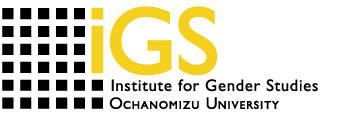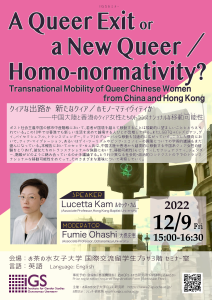2022.12.9 The IGS seminar “A Queer Exit a Norew Queer/Homo-normativity?: Transnational Mobility of Queer Chinese Women from China and Hong Kong”
The IGS seminar “A Queer Exit or a New Queer/Homo-normativity?: Transnational Mobility of Queer Chinese Women from China and Hong Kong” was organized on December 9, 2022, at Ochanomizu University. The speaker was Dr. Lucetta Kam, an associate professor at Hong Kong Baptist University. Initially, Dr. Kam discussed the trajectory of her research project. Over the past decade, she has been working on the issue of transnational mobility of queer women as an extension of her previous ethnographic research on Lala (“queer”) women in Shanghai (2005–2011). Through her current project, she aims to depict the experiences of queer women who emigrate from China and the emergent forms of identities, lives, and aspirations of queer women of recent generations.
Her research focuses on the intersectionality of gender, sexuality, and geographical mobility by examining how mobility acts as a liberating and regulating force for queer women, how sexuality affects mobility and vice versa, and in what ways gender intervenes in queer people’s mobility. Dr. Kam conducted her investigation in Mainland China from 2008 to 2015 and in Hong Kong from 2022. As her research in Hong Kong is ongoing, her talk predominantly focused on the cases of migrants from Mainland China.
During the talk, “queer” was used as an umbrella term to identify the participants of her study. She used the term “queer mobility” to mean the transnational or transcontinental movement of queer Chinese women from China to host countries, regardless of whether the migration was temporary or permanent.
Dr. Kam suggested that new generations of Chinese queer women can now access (or imagine leading) a better life as queer culture is widely accepted in several places and same-sex relationships, partnerships, and marriages of immigrants are approved in many host countries. At the same time, queer women’s transnational mobility must be understood in the context of their cosmopolitan selves in post-socialist China and/or in the context of the desirable normalization. She highlighted that a homonormative value about being a “good” queer person is emerging in cosmopolitan and post-socialist China, and mobility is deeply is related to this value.
Chuguo (出國) is the Chinese word for outward mobility from China to other parts of the world for various purposes. According to Dr. Kam, chuguo is a symbol of success in post-socialist China. Young urban elites and middle-class people regard achieving higher social status and cultural capital as an important issue. Chuguo is a desirable way to access such capital. In the same vein, for queer women, transnational mobility itself works as a form of capital to negotiate their gender and sexual non-conformity. Dr. Kam’s study shows that through transnational movement, Chinese queer women obtain gender and sexual autonomy and respect in the society. Through studying abroad, traveling as tourists, and working in international neoliberal societies, they seek to gain this autonomy and respect.
Further, based on the “politics of public correctness” (Kam 2013), an analytical concept that she has described in her previous work, Dr. Kam stated that Chinese queer women “have to be ‘normal’ before being gay or lesbian.” Being a publicly correct person means being “a law-abiding citizen, an economically productive member of society, an obedient daughter and a ‘model’ homosexual (that is, one who fits into the homonormative imagination of ‘healthy’ and ‘sunny’ representations)” (Kam 2013: 90). Transnational mobility or chuguo has become a norm for the young urban population and professional class in Chinese society, which is incorporated into the politics of public correctness for queer subjects.
Dr. Kam also referred to some concrete cases that she had collected through her fieldwork. These case studies helped the audience understand the realities of queer Chinese migrants of different age groups, relationship statuses, destinations, and occupations, and better comprehend the ideas discussed by Dr. Kam. In the Q&A session, Dr. Kam provided data collected during her ongoing research in Hong Kong. The seminar was organized for a live audience and also streamed online. I believe that everyone who joined this seminar had a fruitful time.
References
Kam, Lucetta Yip Lo, 2013, Shanghai Lalas: Female Tongzhi Communities and Politics in Urban China (Queer Asia): Hong Kong University Press.
Reported by Hinako Komamura (Ph.D Student at Ochanomizu University)


